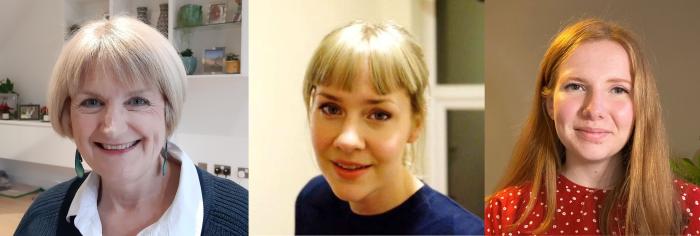ARC East of England researchers are collaborating with lived experience expert Sarah Rae on the MINDS project to improve people’s experiences and outcomes following discharges from mental health hospitals, through better planning and engagement. For Mental Health Awareness Week, they shared how this inspirational project developed and progress so far.

Sarah Rae (left) is Co-Chief Investigator for the MINDS Study with Clinical Psychologist Corinna Hackmann (centre) supported by Study Manager, Charlotte Wheeler (right). Sarah said: “I conceived the idea for the MINDS study in 2018 after experiencing a distressing discharge at the end of an 8-month admission to an acute mental health ward. Afterwards, I heard from past patients that unfortunately this was not an unusual experience. These anecdotes were supported by research into discharge processes and outcomes, and I was struck by disturbing findings from the mental health charity Mind’s Leaving Hospital Survey in 2017, which spurred me on to seek academic support to develop a funding proposal for a coproduced study - MINDS.
“The aim of this project is to improve the experience and outcomes related to discharge from a mental health hospital through improved discharge planning. NICE guidance recommends that, for discharge planning to be effective, it should be collaborative and person-centred, but the Mind survey and our own preliminary work found that this is rarely the case. As a result, people often feel poorly prepared for discharge, and this can lead to relapse and readmission to hospital. Our research has found that the reasons for this breakdown in discharge planning are complex, varied and interactive. We have developed a co-design process, with healthcare engineers at the University of Cambridge, to develop a systemic approach to discharge that is balanced to meet the needs of service users, carers and healthcare staff.
“I hope that the MINDS study will increase our understanding of discharge experiences from the perspective of people with lived experience, carers and staff, and that ultimately this results in more holistic discharge planning that meets the needs of everyone engaged in the process, and improves people’s transitions from mental health wards.”
Sarah Rae, Co-Lead for MINDS study
As MINDS Co-Lead, Sarah brings her insights and lived experience of mental health challenges including discharge to the project. It is also supported by a diverse Lived Experience Advisory Group (LEAG), who are members of the research team, and steering committee providing scrutiny and oversight, guiding strategic decision making and coproducing key outputs throughout the project at all stages. Each work package is co-led by a researcher with lived experience of discharge, and LEAG members will also be co-presenting the research at events as well as co-authoring articles and academic publications to share the findings.
The MINDS study is using novel methodology to understand and address the complex issue of discharge from mental health services. The research team are combining a realist approach examining whether an intervention works, why, how and for whom, with healthcare engineering to improve the way care is delivered within multilayered, complex systems. Alongside the influence of these systems, the project is considering the interpersonal factors affecting discharge and ensuring lived experience is woven throughout this research.
So far, the team has undertaken a deep dive to understand the discharge planning needs of service users, carers and supporters – and the conditions that are needed for staff to deliver this. This was the basis for a rigorous co-design process which produced the Onwards Approach to adapt and meet the needs of service users, supporters, and staff during discharge planning. It is a cohesive approach with six components: Onwards Planner, Supporter Onwards Planner, Supportive Practice, Gradual Leave, Mini Teams/Team Holding, and Onwards Postcards. These can be used together for holistic discharge planning to support everyone involved.
The next steps involve implementing and evaluating the Onwards Approach which includes collecting data to understand whether people find the approach beneficial, the barriers and facilitators of implementing it, and the cost impact of the approach. These findings will be used to refine the Onwards Approach and develop recommendations for improved discharge planning and the implementation. This will inform the development of a large scale study to evaluate the effectiveness and implementation of the Onwards Approach with different mental health care providers in different areas.
The team regularly review whether they are meeting high standards of coproduction and involvement with a survey sent to the LEAG and research co-design workshop participants. All respondents agreed that they felt supported to share ideas and were listened to, with care and support for participants always on offer. Some individual comments are shared below:
“Regular feedback opportunities ensure genuine coproduction. Really good example is the change of the name from the ‘Systemic Discharge Approach’, now renamed to ‘Onwards Approach’.”
“It’s been a valuable process to be part of, thank you for giving me the opportunity to be part of it.”
“I think the ideas are great - I love that you listened to us and have made a good plan of how to go further with this. Very clear and detailed plans.”
“I think there is space given to service users to talk about their experiences personally in a relevant way.”
MINDS study and workshop participants
Effective patient and public involvement makes research more relevant and more reflective of specific community needs and increases participation in research studies or clinical trials. People with lived experience bring fresh ideas that researchers may not have considered and different perspectives. Combining clinical and academic expertise with lived experience creates a greater project team, challenging traditional power structures and barriers and ultimately can deliver more accessible outputs engaging wider audiences, to reach other patients and healthcare staff. Pre-grant funding, capacity building and support are essential to enable people with lived experience to take forward their research ideas.
The team reflected on why integration of lived experience is so critical to MINDS, as the study aims to improve service experience and outcomes for people who use inpatient services.
“We found early on that the lived experience lens is integral to framing the project, developing the aims and the questions we ask, and making sense of our outputs. The lived experience perspective influences our values and methodological approaches, from understanding the problems and generating solutions to guiding pivotal decisions and project outputs.”
Charlotte Wheeler, MINDS Study Manager
This project is supported by the NIHR ARC East of England (ARC EoE) Inclusive Involvement research theme, Hertfordshire Partnership University NHS Foundation Trust, East London NHS Foundation Trust and Norfolk and Suffolk NHS Foundation Trust. ARC EoE helped to secure funding and provide vouchers to reimburse participants at consultation meetings, as well as publicising the project and arranging opportunities to present at regional events.
- Find out more about the MINDS study on the website, with brief animations describing their Onwards Approach.
